专升本英语时态专题
- 格式:doc
- 大小:37.00 KB
- 文档页数:4
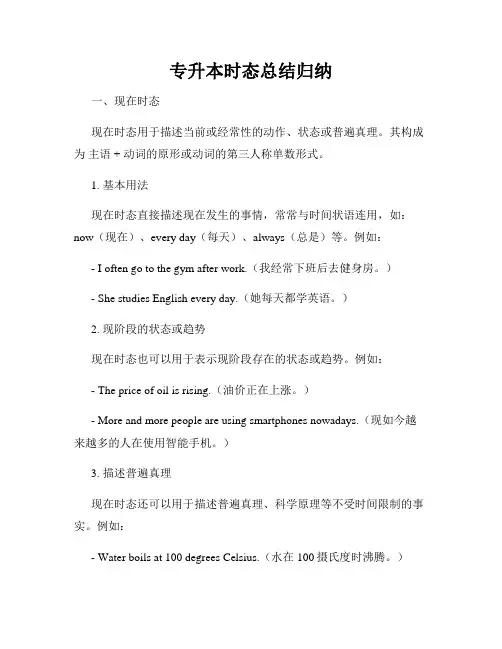
专升本时态总结归纳一、现在时态现在时态用于描述当前或经常性的动作、状态或普遍真理。
其构成为主语 + 动词的原形或动词的第三人称单数形式。
1. 基本用法现在时态直接描述现在发生的事情,常常与时间状语连用,如:now(现在)、every day(每天)、always(总是)等。
例如:- I often go to the gym after work.(我经常下班后去健身房。
)- She studies English every day.(她每天都学英语。
)2. 现阶段的状态或趋势现在时态也可以用于表示现阶段存在的状态或趋势。
例如:- The price of oil is rising.(油价正在上涨。
)- More and more people are using smartphones nowadays.(现如今越来越多的人在使用智能手机。
)3. 描述普遍真理现在时态还可以用于描述普遍真理、科学原理等不受时间限制的事实。
例如:- Water boils at 100 degrees Celsius.(水在100摄氏度时沸腾。
)- The sun rises in the east.(太阳从东方升起。
)二、过去时态过去时态(简称“过去时”)用于描述已经发生或完成的动作、情况或状态。
其构成为主语 + 动词的过去式。
1. 单纯的过去事件过去时态常用于描述已经发生的、与过去相关的事情。
例如:- I went to the cinema last night.(昨晚我去了电影院。
)- He studied English when he was in high school.(他在高中时学习英语。
)2. 过去经常性的动作过去时态也可以用于描述过去经常性发生的动作。
常与时间状语连用。
例如:- She always played basketball with her friends after school.(她放学后总是和朋友们一起打篮球。
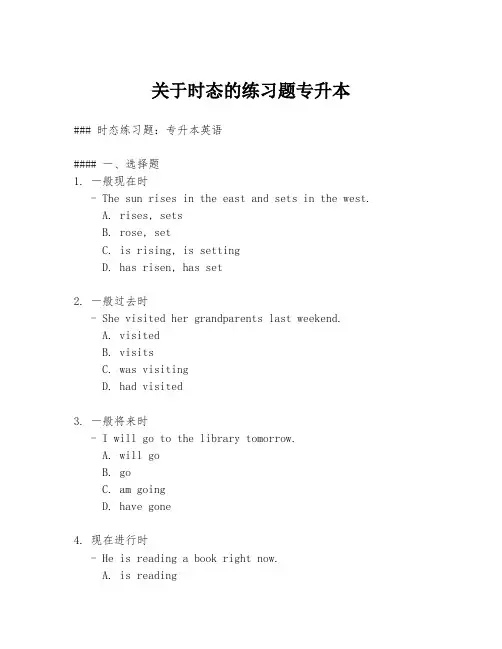
关于时态的练习题专升本### 时态练习题:专升本英语#### 一、选择题1. 一般现在时- The sun rises in the east and sets in the west.A. rises, setsB. rose, setC. is rising, is settingD. has risen, has set2. 一般过去时- She visited her grandparents last weekend.A. visitedB. visitsC. was visitingD. had visited3. 一般将来时- I will go to the library tomorrow.A. will goB. goC. am goingD. have gone4. 现在进行时- He is reading a book right now.A. is readingB. readsC. was readingD. has read5. 过去进行时- They were playing football when it started to rain.A. were playingB. playedC. playD. have played6. 现在完成时- She has finished her homework.A. has finishedB. finishedC. is finishingD. had finished7. 过去完成时- By the time we arrived, the movie had already started.A. had already startedB. has already startedC. startedD. is starting8. 将来完成时- By next year, he will have finished his studies.A. will have finishedB. finishesC. finishedD. is finishing#### 二、填空题1. I have never seen such a beautiful sunset before. (never)2. Had you finished your report before I called you? (finish)3. She is going to have a meeting at 3 pm. (have)4. They were watching a movie when the power went out. (watch)5. The project will be completed by the end of this month. (complete)#### 三、改错题1. (错误) She is waiting for the bus since she got up.(正确) She has been waiting for the bus since she got up.2. (错误) They will have finished their project by the time you arrive.(正确) They will have finished their project by the time you arrive.3. (错误) I am reading the book which my friend recommended.(正确) I am reading the book that my friend recommended.4. (错误) He had already left when I arrived at the airport.(正确) He had already left when I arrived at the airport.5. (错误) We were playing football when the teacher came.(正确) We were playing football when the teacher came.#### 四、翻译题1. 他经常帮助我学习英语。
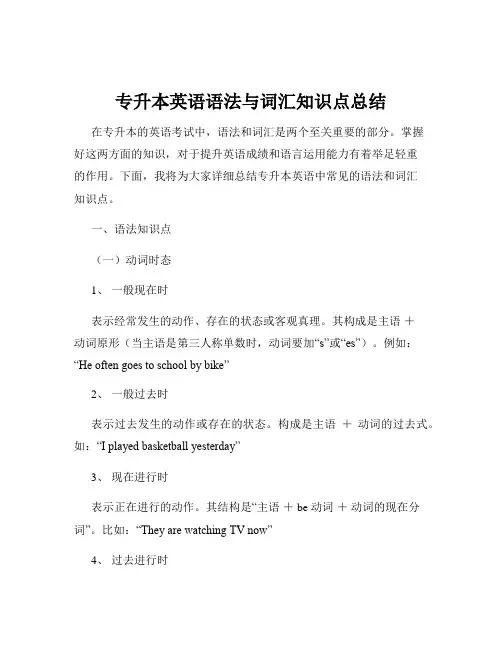
专升本英语语法与词汇知识点总结在专升本的英语考试中,语法和词汇是两个至关重要的部分。
掌握好这两方面的知识,对于提升英语成绩和语言运用能力有着举足轻重的作用。
下面,我将为大家详细总结专升本英语中常见的语法和词汇知识点。
一、语法知识点(一)动词时态1、一般现在时表示经常发生的动作、存在的状态或客观真理。
其构成是主语+动词原形(当主语是第三人称单数时,动词要加“s”或“es”)。
例如:“He often goes to school by bike”2、一般过去时表示过去发生的动作或存在的状态。
构成是主语+动词的过去式。
如:“I played basketball yesterday”3、现在进行时表示正在进行的动作。
其结构是“主语+ be 动词+动词的现在分词”。
比如:“They are watching TV now”4、过去进行时强调过去某个时间正在进行的动作,形式为“主语+ was/were +动词的现在分词”。
像:“I was reading a book at that time”5、现在完成时表示过去发生的动作对现在造成的影响或结果,或者从过去开始一直持续到现在的动作。
其构成是“主语+ have/has +过去分词”。
例如:“She has learned English for five years”6、过去完成时表示过去某个时间之前已经完成的动作,结构是“主语+ had +过去分词”。
比如:“By the end of last year, we had learned 2000 words”(二)语态1、主动语态主语是动作的执行者。
例如:“He opened the door”2、被动语态主语是动作的承受者,构成是“be +过去分词”。
如:“The door was opened by him”(三)非谓语动词1、动词不定式具有名词、形容词和副词的特征,可作主语、宾语、定语、状语等。
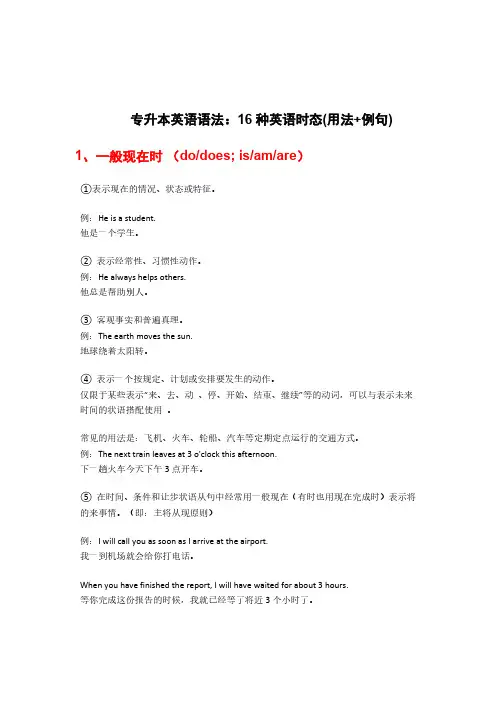
专升本英语语法:16种英语时态(用法+例句)1、一般现在时(do/does;is/am/are)①表示现在的情况、状态或特征。
例:He is a student.他是一个学生。
②表示经常性、习惯性动作。
例:He always helps others.他总是帮助别人。
③客观事实和普遍真理。
例:The earth moves the sun.地球绕着太阳转。
④表示一个按规定、计划或安排要发生的动作。
仅限于某些表示“来、去、动、停、开始、结束、继续”等的动词,可以与表示未来时间的状语搭配使用。
常见的用法是:飞机、火车、轮船、汽车等定期定点运行的交通方式。
例:The next train leaves at3o'clock this afternoon.下一趟火车今天下午3点开车。
⑤在时间、条件和让步状语从句中经常用一般现在(有时也用现在完成时)表示将的来事情。
(即:主将从现原则)例:I will call you as soon as I arrive at the airport.我一到机场就会给你打电话。
When you have finished the report,I will have waited for about3hours.等你完成这份报告的时候,我就已经等了将近3个小时了。
2、现在进行时(am/is/are doing)①表示此时此刻正在发生的事情。
例:He is listning to the music now.他现在正在听音乐。
②表示目前一段时间内一直在做的事情,但不一定此时此刻正在做。
例:I am studying computer this term.这个学期我一直在学习计算机。
③现在进行时可以表示将来的含义。
a.瞬时动词的进行一定表将来。
例:I am leaving.我要离开了。
b.持续动词的进行只有有将来的时间状语或有将来语境中才表将来。
例:I am travelling next month.下个月我要去旅行。
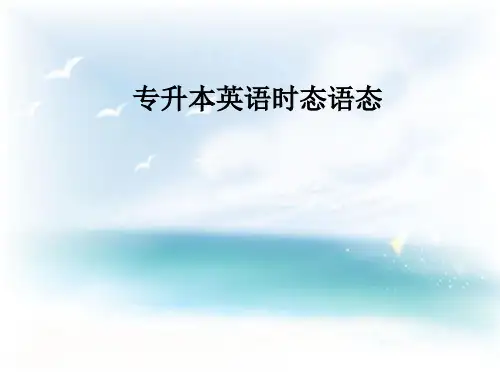
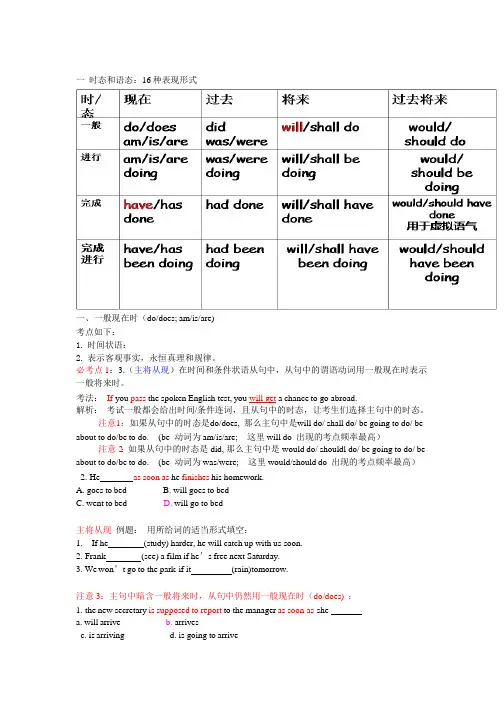
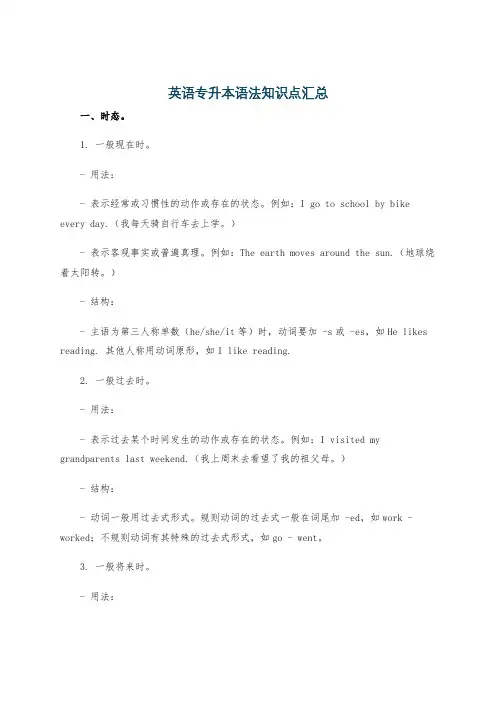
英语专升本语法知识点汇总一、时态。
1. 一般现在时。
- 用法:- 表示经常或习惯性的动作或存在的状态。
例如:I go to school by bike every day.(我每天骑自行车去上学。
)- 表示客观事实或普遍真理。
例如:The earth moves around the sun.(地球绕着太阳转。
)- 结构:- 主语为第三人称单数(he/she/it等)时,动词要加 -s或 -es,如He likes reading. 其他人称用动词原形,如I like reading.2. 一般过去时。
- 用法:- 表示过去某个时间发生的动作或存在的状态。
例如:I visited my grandparents last weekend.(我上周末去看望了我的祖父母。
)- 结构:- 动词一般用过去式形式。
规则动词的过去式一般在词尾加 -ed,如work - worked;不规则动词有其特殊的过去式形式,如go - went。
3. 一般将来时。
- 用法:- 表示将来某个时间要发生的动作或存在的状态。
例如:I will go to Beijing next month.(我下个月将去北京。
)- 结构:- 常见的结构有will+动词原形,be going to+动词原形(表示计划、打算做某事或有迹象表明即将发生某事)。
如He is going to have a party tonight.(他今晚打算举办一个聚会。
)4. 现在进行时。
- 用法:- 表示现在正在进行的动作或存在的状态。
例如:She is reading a book now.(她现在正在读一本书。
)- 结构:- be动词(am/is/are)+动词的 -ing形式。
5. 过去进行时。
- 用法:- 表示过去某个时刻或某段时间正在进行的动作。
例如:I was watching TV at 8 o'clock last night.(昨晚8点我正在看电视。
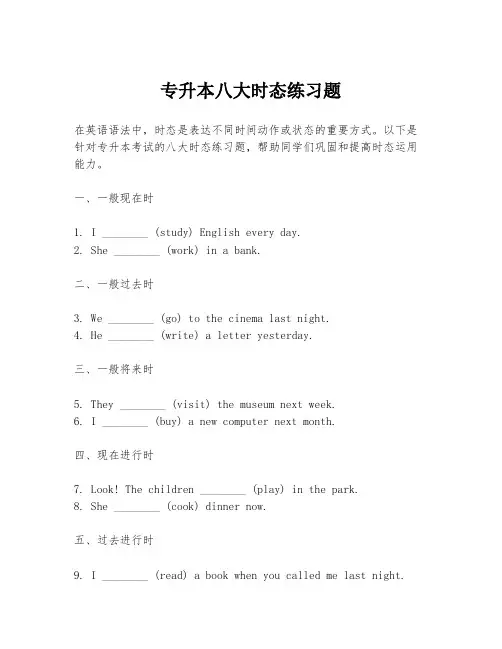
专升本八大时态练习题在英语语法中,时态是表达不同时间动作或状态的重要方式。
以下是针对专升本考试的八大时态练习题,帮助同学们巩固和提高时态运用能力。
一、一般现在时1. I ________ (study) English every day.2. She ________ (work) in a bank.二、一般过去时3. We ________ (go) to the cinema last night.4. He ________ (write) a letter yesterday.三、一般将来时5. They ________ (visit) the museum next week.6. I ________ (buy) a new computer next month.四、现在进行时7. Look! The children ________ (play) in the park.8. She ________ (cook) dinner now.五、过去进行时9. I ________ (read) a book when you called me last night.10. They ________ (discuss) the project when the boss came in.六、现在完成时11. I ________ (finish) my homework already.12. She ________ (live) in this city for ten years.七、过去完成时13. We ________ (arrive) at the airport before the flighttook off.14. He ________ (study) French before he went to France.八、将来完成时15. By the end of this year, he ________ (work) here for five years.16. By the time she gets home, we ________ (finish) dinner.答案1. study2. works3. went4. wrote5. will visit6. will buy7. are playing8. is cooking9. was reading10. were discussing11. have finished12. has lived13. had arrived14. had studied15. will have worked16. will have finished通过这些练习题,同学们可以检验自己对八大时态的掌握情况。
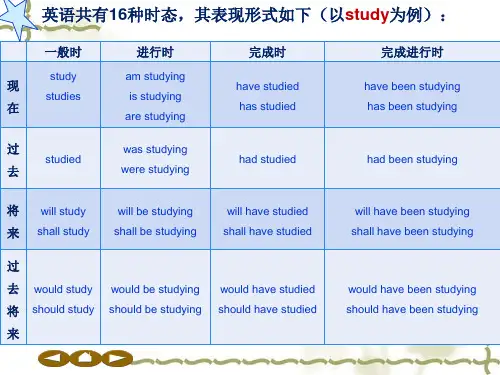
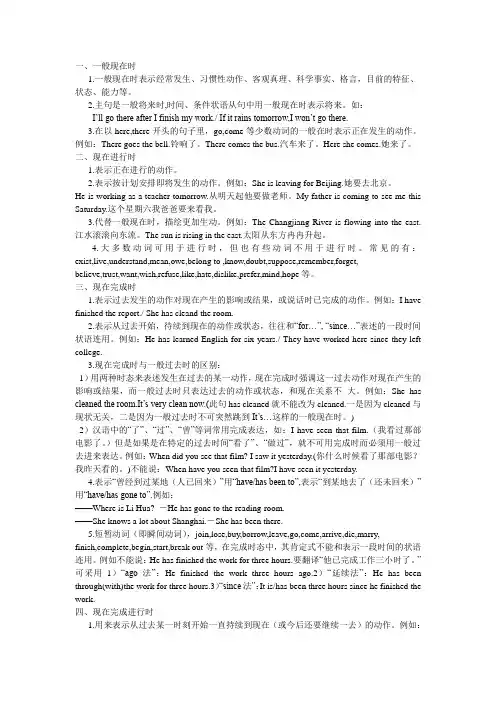
一、一般现在时1.一般现在时表示经常发生、习惯性动作、客观真理、科学事实、格言,目前的特征、状态、能力等。
2.主句是一般将来时,时间、条件状语从句中用一般现在时表示将来。
如:I’ll go there after I finish my work./ If it rains tomorrow,I won’t go there.3.在以here,there开头的句子里,go,come等少数动词的一般在时表示正在发生的动作。
例如:There goes the bell.铃响了。
There comes the bus.汽车来了。
Here she comes.她来了。
二、现在进行时1.表示正在进行的动作。
2.表示按计划安排即将发生的动作。
例如:She is leaving for Beijing.她要去北京。
He is working as a teacher tomorrow.从明天起他要做老师。
My father is coming to see me this Saturday.这个星期六我爸爸要来看我。
3.代替一般现在时,描绘更加生动。
例如:The Changjiang River is flowing into the east.江水滚滚向东流。
The sun is rising in the east.太阳从东方冉冉升起。
4.大多数动词可用于进行时,但也有些动词不用于进行时。
常见的有:exist,live,understand,mean,owe,belong to ,know,doubt,suppose,remember,forget,believe,trust,want,wish,refuse,like,hate,dislike,prefer,mind,hope等。
三、现在完成时1.表示过去发生的动作对现在产生的影响或结果,或说话时已完成的动作。
例如:I have finished the report./ She has cleand the room.2.表示从过去开始,待续到现在的动作或状态,往往和“for…”, “since…”表述的一段时间状语连用。
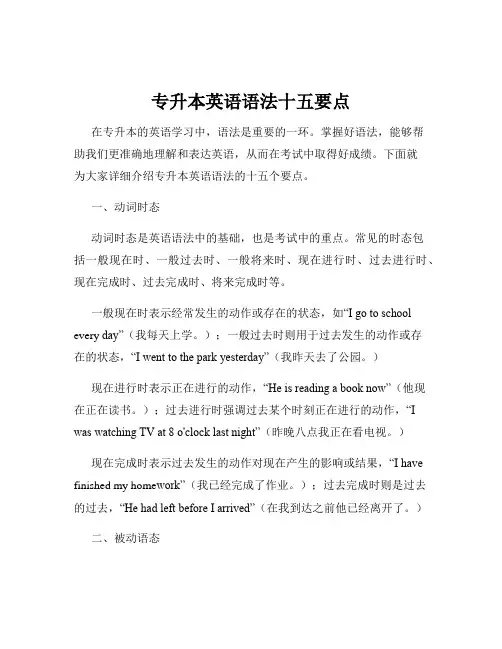
专升本英语语法十五要点在专升本的英语学习中,语法是重要的一环。
掌握好语法,能够帮助我们更准确地理解和表达英语,从而在考试中取得好成绩。
下面就为大家详细介绍专升本英语语法的十五个要点。
一、动词时态动词时态是英语语法中的基础,也是考试中的重点。
常见的时态包括一般现在时、一般过去时、一般将来时、现在进行时、过去进行时、现在完成时、过去完成时、将来完成时等。
一般现在时表示经常发生的动作或存在的状态,如“I go to school every day”(我每天上学。
);一般过去时则用于过去发生的动作或存在的状态,“I went to the park yesterday”(我昨天去了公园。
)现在进行时表示正在进行的动作,“He is reading a book now”(他现在正在读书。
);过去进行时强调过去某个时刻正在进行的动作,“I was watching TV at 8 o'clock last night”(昨晚八点我正在看电视。
)现在完成时表示过去发生的动作对现在产生的影响或结果,“I have finished my home work”(我已经完成了作业。
);过去完成时则是过去的过去,“He had left before I arrived”(在我到达之前他已经离开了。
)二、被动语态被动语态在英语中使用广泛,其基本构成是“be +过去分词”。
例如,“The book is written by him”(这本书是他写的。
)需要注意的是,不同时态的被动语态形式有所不同,要牢记各种时态下被动语态的构成。
三、非谓语动词非谓语动词包括动词不定式、动名词和分词(现在分词和过去分词)。
动词不定式常用来表示目的、将来等,“I want to go shopping”(我想去购物。
)动名词具有名词的性质,“Swimming is my favorite sport”(游泳是我最喜欢的运动。
)现在分词表示主动和进行,过去分词表示被动和完成。
专升本时态专项练习题一、选择题(每题1分,共10分)1. The concert ________ last night was very successful.A) was heldB) heldC) to be heldD) being held2. By the time you arrive in London, we ________ for three days.A) will have been stayingB) have stayedC) will stayD) have been staying3. I ________ to the library as soon as I finish my homework.A) goB) wentC) will goD) am going4. ________ you ever ________ to New York?A) Have, beenB) Did, goC) Do, goD) Will, go5. The company ________ a lot of money since it was founded.A) has madeB) madeC) was makingD) is making6. She ________ her keys in the office when she left.A) forgotB) had forgottenC) forgetsD) is forgetting7. The project, which ________ for two years, is now nearly complete.A) has been going onB) has gone onC) went onD) is going on8. I ________ my pen when I ________ the door.A) dropped, openedB) was dropping, openedC) had dropped, was openingD) have dropped, have opened9. ________ you ________ your work, you can go home.A) Once, finishedB) After, finishedC) When, finishD) As soon as, finish10. He ________ in the park when he was a child.A) used to playB) is used to playingC) used to playingD) is used to play二、填空题(每题1分,共10分)11. I ________ (not see) my uncle for years.12. The children ________ (play) in the garden when itstarted to rain.13. She ________ (not finish) her novel by the time you arrive.14. ________ you ________ (ever visit) the Great Wall?15. The company ________ (expand) rapidly since 2010.16. The food ________ (smell) delicious when I walked intothe kitchen.17. He ________ (not be) very happy with the result.18. ________ you ________ (study) English before you came to college?19. ________ (be) the meeting over by the time we get there?20. She ________ (go) to the gym every day since she moved to the city.三、改错题(每题1分,共5分)21. He is said to have been working here since 2005. (改为现在完成进行时)22. She is used to go to the gym every morning. (改为正确表达)23. I have been lived here for two years. (改正时态错误)24. The children were playing in the park when the bell rang. (改为过去完成时)25. The project has been going on two years. (改正时态错误)四、完形填空(每题1分,共5分)Once upon a time, there was a young man who was very ambitious. He ________ (26) to travel around the world. He ________ (27) a lot of money for his journey and one day, he ________ (28) his journey. He ________ (29) many countries and ________ (30) many interesting stories.26. A) dreamedB) was dreamingC) dreamsD) is dreaming27. A) savedB) has savedC) had savedD) was saving28. A) startedB) has startedC) had startedD) is starting29. A) visitedB) has visitedC) had visitedD) is visiting30. A) heardB) has heardC) had heardD) is hearing五、翻译题(每题2分,共10分)31. 他昨天没有来上课,因为他生病了。
专升本英语时态知识点总结时态是英语语法中的一个重要组成部分,它表示动作发生的时间。
掌握时态的正确使用对于提高英语语言能力是至关重要的。
下面是专升本英语时态知识点的总结。
一、一般现在时1.表示经常性、习惯性的动作或事实。
2.表示客观真理、自然规律等。
3. 在主语为第三人称单数的情况下,动词需加-s或-es。
二、一般过去时1.表示过去一些时间发生的动作或事实。
2.在句子中常与表示过去的时间状语连用。
三、一般将来时1.表示将来一些时间还未发生的动作或事实。
2.常与将来的时间状语连用。
四、现在进行时1.表示现在正在进行的动作。
2. be动词+动词-ing形式构成。
五、过去进行时1.表示过去一些时间正在进行的动作。
2. was/were+动词-ing形式构成。
六、将来进行时1.表示将来一些时间将会进行的动作。
2. will be+动词-ing形式构成。
七、现在完成时1.表示过去发生的动作对现在造成的影响。
2. have/has+过去分词构成。
3.常与表示过去到现在的时间段连用。
八、过去完成时1.表示过去一些时间之前已经完成的动作。
2. had+过去分词构成。
九、将来完成时1.表示将在将来一些时间之前完成的动作。
2. will have+过去分词构成。
十、一般将来时1.表示将来一些时间发生的动作或事实。
2. 助动词shall/will+动词原形构成。
3. shall一般用于第一人称(I、we)。
4. will一般用于第二、第三人称(you、he、she、it、they)。
十一、现在完成进行时1.表示过去开始持续到现在,并可能继续进行下去的动作。
2. have/has been+动词-ing形式构成。
以上是关于专升本英语时态知识点的总结。
掌握了这些知识点,可以帮助我们准确地表达动作发生的时间和情况。
在日常学习和使用中,需要多加练习,通过不断的实践来熟练掌握时态的使用。
专升本英文时态语态练习题一、选择题(每题2分,共20分)1. The teacher said that he _______ the book before.A. has readB. had readC. is readingD. was reading2. By the time we got there, the concert _______.A. had startedB. startedC. is startingD. was starting3. She _______ her homework when the phone rang.A. didB. was doingC. doesD. has done4. They _______ the project by the end of next month.A. will have completedB. will completeC. have completedD. completed5. I _______ you if I had your phone number.A. would callB. will callC. would have calledD. had called6. The house _______ by the time we got home.A. had been cleanedB. was cleanedC. is cleanedD. will be cleaned7. When I arrived, they _______ the meeting.A. had been havingB. were havingC. had hadD. have had8. The company _______ a new product next year.A. will launchB. is going to launchC. launchesD. launched9. She _______ the letter as soon as she received it.A. readB. was readingC. has readD. will read10. By the time you finish this exercise, we _______ a lot.A. will learnB. have learnedC. are learningD. learned二、填空题(每题2分,共20分)11. I _______ (study) in this university for two years bynext month.12. They _______ (not finish) their homework when the teacher came in.13. She _______ (not go) to the party if it rains tomorrow.14. We _______ (be) to Paris twice before we moved here.15. The children _______ (play) in the garden when their mother came home.16. He _______ (learn) how to swim by the time he was ten.17. The flowers _______ (smell) sweet when you _______ (water) them regularly.18. If I _______ (know) his phone number, I would have called him.19. The concert _______ (start) when we arrived at the venue.20. She _______ (be) a teacher for five years by the time she retired.三、改错题(每题2分,共20分)21. He said that he is going to visit his parents next week. (改为过去将来时)22. They were having dinner when I arrived to their house.(改为过去进行时)23. She is a very good singer and she sings beautifully. (改为过去时)24. The children were playing in the garden when their mother came home. (改为过去完成时)25. I have finished my homework. (改为过去完成时)26. The company launched a new product last year. (改为过去完成时)27. She has been a teacher for five years. (改为过去完成进行时)28. They will have finished the project by the end of this month. (改为过去将来完成时)29. The house was cleaned by the time we got home. (改为过去完成时)30. I will call you as soon as I arrive at the airport. (改为过去将来时)四、翻译题(每题5分,共40分)31. 昨天我去了图书馆,借了几本书。
专升本时态练习题及答案一、选择题1. I have been studying English for three years.A) since 2019B) in 2019C) by 2019D) until 20192. She will be arriving at the airport in an hour.A) has arrivedB) was arrivingC) is arrivingD) will arrive3. They were having dinner when the phone rang.A) were havingB) hadC) haveD) have had4. The concert had started before we got there.A) had startedB) startedC) startsD) will start5. By the time you arrive, I _______ my homework.A) will finishB) finishC) have finishedD) finished二、填空题6. I _______ (not see) my uncle for three years.7. She _______ (study) in the library when it rained yesterday.8. The children _______ (play) in the park since they arrived.9. The project _______ (complete) by the end of this month.10. We _______ (not go) to the beach if it rains tomorrow.三、改错题11. She is going to visit her grandparents last week.Correct: She is going to visit her grandparents next week.12. They have already finished their project last month.Correct: They have already finished their project last month.13. He was reading a book when I entered the room.Correct: He was reading a book when I entered the room.14. The train leaves at 6:00 PM and arrives at 8:00 PM.Correct: The train leaves at 6:00 PM and will arrive at8:00 PM.15. I have been living here since I was born.Correct: I have been living here since I was born.四、答案1. A2. C3. A4. A5. C6. haven't seen7. was studying8. have been playing9. will be completed10. won't go11. Correct12. Correct13. Correct14. Correct15. Correct本练习题旨在帮助学生掌握英语时态的用法,通过选择题、填空题和改错题的形式,让学生在实际语境中运用不同的时态。
专升本英语动词时态知识点大全在专升本英语的学习中,动词时态是一个至关重要的知识点。
掌握好动词时态,不仅能够帮助我们正确理解和表达英语,还能在各种考试中取得优异的成绩。
接下来,让我们一起深入了解一下专升本英语中常见的动词时态。
一、一般现在时一般现在时表示经常发生的动作、存在的状态或者普遍真理。
其基本结构是:主语+动词原形(当主语是第三人称单数时,动词要加“s”或“es”)。
例如:“I play basketball every day”(我每天都打篮球。
)“He likes music”(他喜欢音乐。
)一般现在时常用于以下情况:1、表示经常性或习惯性的动作,常与 often, usually, always, sometimes 等时间状语连用。
2、表示现在的状态或特征,如“ I am a student”(我是一名学生。
)3、表示客观事实和普遍真理,例如“ The earth moves around the sun”(地球绕着太阳转。
)二、一般过去时一般过去时表示过去某个时间发生的动作或存在的状态。
其基本结构是:主语+动词的过去式。
例如:“I went to Beijing last year”(我去年去了北京。
)“She was happy yesterday”(她昨天很开心。
)一般过去时通常与表示过去的时间状语连用,如:yesterday, last week, ago, in 1990 等。
三、一般将来时一般将来时表示将来要发生的动作或存在的状态。
其常见的结构有:1、“will +动词原形”,例如:“I will visit my grandparents next weekend”(我下周末将去看望我的祖父母。
)2、“be g oing to +动词原形”,强调计划、打算做某事,如:“Sheis going to study abroad next year”(她打算明年出国留学。
)四、现在进行时现在进行时表示正在进行的动作。
专升本英语时态知识点总结一、一般时态1.一般现在时一般现在时用来表示当前的习惯或经常发生的动作,以及普遍真理和科学事实。
它的构成是主语+动词原形。
例如:She eats breakfast every morning.2.一般过去时一般过去时用来表示过去某个时间或一段时间里发生的动作。
它的构成是主语+动词过去式。
例如:She went to school yesterday.3.一般将来时一般将来时用来表示将来某个时间或一段时间里将要发生的动作。
它的构成是将来时助动词will/shall+动词原形。
例如:She will go to the park tomorrow.二、进行时态1.现在进行时现在进行时用来表示现在正在进行的动作。
它的构成是be动词(am/is/are)+动词的现在分词。
例如:She is reading a book.2.过去进行时过去进行时用来表示过去某个时间点或一段时间里正在进行的动作。
它的构成是过去时的be动词(was/were)+动词的现在分词。
例如:She was watching TV when the phone rang.3.将来进行时将来进行时用来表示将来某个时间点或一段时间里将会正在进行的动作。
它的构成是将来时的be动词(will be)+动词的现在分词。
例如:She will be studying at 8 o'clock tomorrow.三、完成时态1.现在完成时现在完成时用来表示过去某时发生的动作对现在产生的影响。
它的构成是have/has+动词的过去分词。
例如:She has finished her homework.2.过去完成时过去完成时用来表示过去某个时间或一段时间里发生的动作之前已经发生的动作。
它的构成是过去完成时的have/has+动词的过去分词。
例如:She had already left when the party started.3.将来完成时将来完成时用来表示将来某个时间或一段时间里将会发生的动作之前已经发生的动作。
英语时态精选习题2. It's the third time I ______him this month.A had seenB seeC sawD have seen3. If you go to the western suburbs of the city, you ___a lot of new buildings .A will seeB have seenC seeD are going to see5. She showed him the photo she __the day before.A has takenB tookC was takingD had taken6. While Tom ___, his sister is writing.A readsB has readC has been readingD is reading7. By the time he was ten, Edison _____experiments in chemistry.A had already doneB already had doneC was already doingD already did8. I don’t know if it _____or not tomorrow.A will snowB snowsC has snowedD is snowing9. He was sixty-eight. In two years he _____seventy.A was going to beB would beC had beenD will be11. He said that honesty _____the key to success.A wasB will beC isD is being12. She _____in London till next Monday.A will have stayedB has stayedC is stayingD has been staying13. We _____each other since I left Shanghai.A haven't seenB hadn't seenC didn't seeD wouldn't see14. I'll return the book to the library as soon as I_____it .A will finishB am going to finishC finishedD have finished16. Don't go and bother him. He _____in the room.A writesB has writtenC is writingD has been writing20. Don't get off until the bus _____.A stoppedB will stopC will have stoppedD stops22. He ____with us since he returned last month.A livesB livedC had livedD has lived23. They ___to help but could not get here in time.A had wantedB have wantedC was wantingD want24. They will go to work in the countryside when they ____school next year.A will leaveB will have leaveC are leavingD leave25. I didn't know when they ___again.A cameB were comingC had comeD had been coming26. The fence ____near the window.A standB is standingC have stoodD stands28. We ___a meeting from 2 to 4 yesterday afternoon.A had hadB would haveC were havingD had30. If it ____tomorrow, we won't go to the school farm.A is to rainB will be rainingC will rainD rains32. I _____Tom has made a mistake.A am thinkingB shall thinkC thinkD have been thinking34. When ____you___ to study English?A have;begunB did;beginC had;begunD do;begin36. I'll look after your children after you _____.A will goB will have goneC are goneD went39. The teacher said that we ______ten lessons by the end of this term.A should studyB have studiedC were going to studyD will have studied40. We __there when it____to rain.A were getting;would beginB were about to get;beganC had got;had begunD would get;began42. It _____ten years since he left Shanghai.A wasB isC had beenD will be43. We _____ about two thousand English words by the end of last term.A learnedB have learnedC had learnedD would learn45. It ___long before we celebrate the New Year's Day.A isn'tB hasn't beenC wasn'tD won't be47. I ____along the road when suddenly some patted me on the shoulder from behind.A walkedB had walkedC was walkingD would walk49. I didn't know a thing about the verbs, for I ____them.A wouldn’t studyB haven't studiedC hadn't studiedD wasn't studying50. Don't be late, Mary, the train _____at 8 a.m.A is startingB has startedC would startD starts51. There will come a day when the people of the whole country __a happy life.A liveB will liveC will have livedD are living54. We ____our seats till the party had begun.A hadn't foundB didn't findC haven't foundD wouldn't fine56. By 1914 Einstein ___world fame.A gainedB would gainC had gainedD was gaining57. The man put on his hat and _____away.A had goneB would goC has goneD went60. she was praised for what she ____A didB has doneC would doD had done61. The book _____on the floor for ten minutes, but no one has picked it up.A is lyingB has lainC has been lyingD lay63. It ____and the streets were still wet.A had been rainingB rainedC has rainedD would rain64. If I ____when he comes, wake me up.A sleepB will sleepC am sleepingD will be sleeping65. Hardly ____the bell _____when the teacher came in.A did --ringB would --ringC has--rungD had --rung66. I ____from him so far.A didn’t hearB don’t hearC haven’t heardD hadn’t heard68. It was two years since I ___with here.A had dinedB was diningC dinedD had been dining69. By this time next year, we _____all the land onto rice fields.A had turnedB will have turnedC have turnedD have been turning70. What_____ you ______this time tomorrow morning?A will; doB have; been doingC are; doingD will; be doing71. In the past it ____people two years to go round the world.A had takenB has takenC tookD was taking72. Great changes ____in my hometown in the past few years.A were taken placeB have been taken placeC took placeD have taken place。